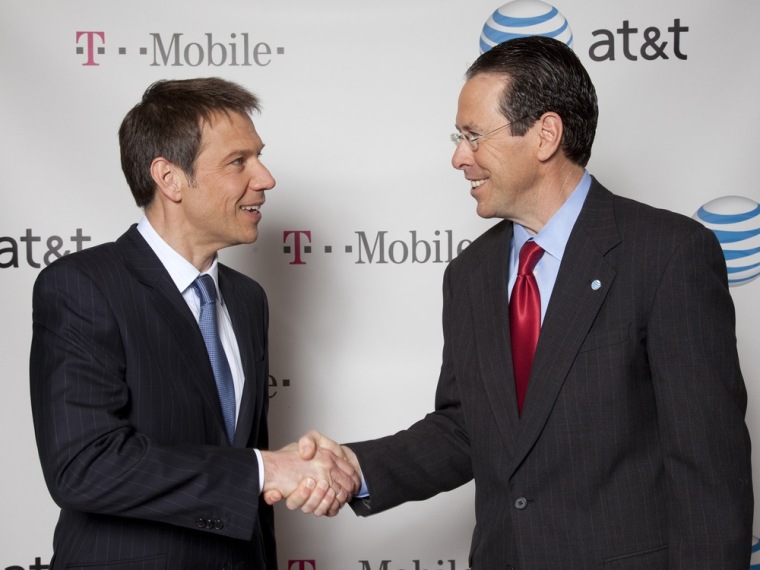AT&T's proposed $39 billion buyout of T-Mobile hit a roadblock on Wednesday when the Department of Justice filed to block the deal over concerns that it would reduce wireless market competition.
“The combination of AT&T and T-Mobile would result in tens of millions of consumers all across the United States facing higher prices, fewer choices and lower quality products for mobile wireless services,” said Deputy Attorney General James M. Cole at a news conference.
AT&T said it would fight and ask for an expedited court hearing "so the enormous benefits of this merger can be fully reviewed." The company said the government "has the burden of proving alleged anti-competitive effects, and we intend to vigorously contest this matter in court."
The deal has faced tough opposition from consumer groups and No. 3 carrier Sprint Nextel since it was announced in March.
Four nationwide providers — Verizon, AT&T, T-Mobile and Sprint — account for more than 90 percent of mobile wireless connections.
T-Mobile has been an important source of competition, including through innovation and quality enhancements such as the roll-out of the first nationwide high-speed data network, according to Sharis Pozen, acting chief of Justice's antitrust division.
Mobile wireless telecom services play an increasing role in day-to-day communications, with more than 300 million smart phones, data cards, tablets and other mobile wireless devices in use.
Deutsche Telekom, the owner of T-Mobile, had no immediate comment. Its shares dropped sharply on the news.
The DOJ's complaint, filed in federal court in Washington, asserts that AT&T and T-Mobile compete directly nationwide, including in 97 of the the country's 100 largest cellular marketing areas. In addition, they compete for business and government contracts.
"Were the merger to proceed, there would only be three providers with 90 percent of the market, and competition among the remaining competitors on all dimensions-including price, quality, and innovation-would be diminished," Cole said.
A failure of the deal puts T-Mobile in a difficult position. It's struggling to compete with the larger carriers, and owner Deutsche Telekom AG has said it's not willing to invest more in the venture.
AT&T has promised T-Mobile $3 billion in cash if the deal doesn't go through, plus spectrum rights and agreements that could be worth billions more.
"It's surprising. Clearly AT&T didn't expect this. AT&T put itself in a position where it would have to pay a hefty break-up fee to T-Mobile USA," said telecoms analyst Steve Clement of Pacific Crest.
AT&T has said the deal would let it add capacity and meet demand for high-speed wireless service. Rivals such as Sprint say it would hurt competition and lead to higher prices, an argument echoed by the Justice Department in the court papers.
The Federal Communications Commission has not made a decision to block the deal. But the agency's chairman did say that the combination of the two companies has raised warning flags according to data it has gathered.
"Although our process is not complete, the record before this agency also raises serious concerns about the impact of the proposed transaction on competition," said FCC Chairman Julius Genachowski in a statement.
The FCC, however, has never approved a significant takeoverr that the DOJ had challenged in court, an FCC official said.
Democratic Sen. Herb Kohl of Wisconsin, who heads the Senate Judiciary subcommittee on antitrust, competition policy and consumer rights, said the suit was an effort to protect consumers "in a powerful and growing industry that reaches virtually every American."
The suit used some of T-Mobile's own documents describing its role in the market to explain why the merger shouldn't take place. In those documents, the company calls itself "the No. 1 challenger of the established big guys in the market and as well positioned in a consolidated 4-player national market."
T-Mobile said its strategy is to attack other companies and find innovative ways to overcome the fact that it is a smaller company.
But T-Mobile has been struggling to keep its customers. Despite low prices and a peppy pitchwoman in a polka-dot dress, T-Mobile customers have been voting with their feet, leaving for other carriers in the last year and a half.
T-Mobile's 33.6 million customers may be heaving a sigh of relief Wednesday that the federal government is trying to block the merger, so they can keep their wireless service plans. But in the long run, T-Mobile is in an unsustainable position. Analysts say the company's past decisions have painted it into a corner.
The No. 4 wireless carrier is being squeezed by competitors from two directions. At the high end of the market, it can't compete with Verizon Wireless and AT&T. At the low end, T-Mobile is struggling against competitors like Sprint, which sells government-subsidized "lifeline" service, and MetroPCS Holdings Corp., which targets urban, working class consumers with cheap "unlimited" plans.
Essentially, T-Mobile is seen as a cheap brand by those who can afford better, and as an expensive one by those who pinch every penny.
"We're stuck in the middle from a brand point of view," T-Mobile CEO Philipp Humm said in January.
